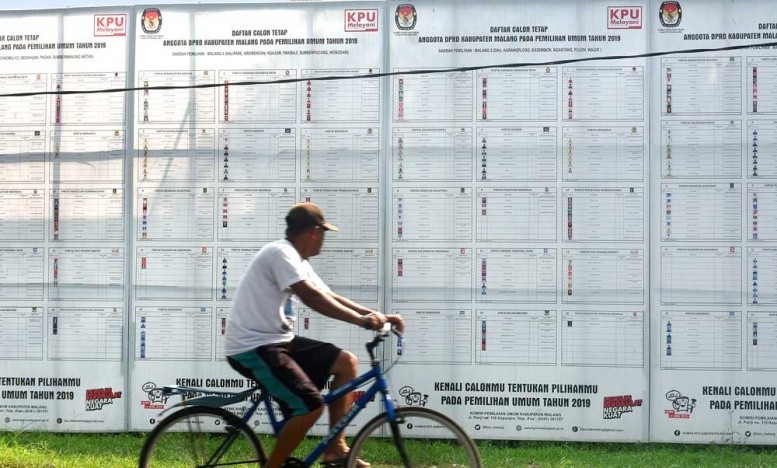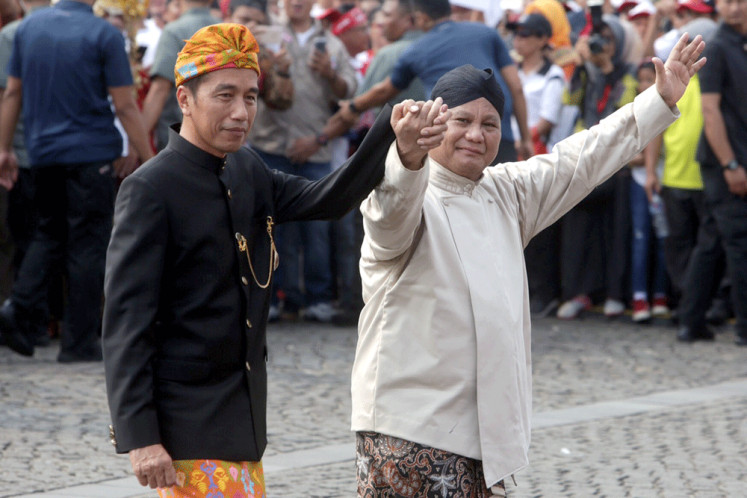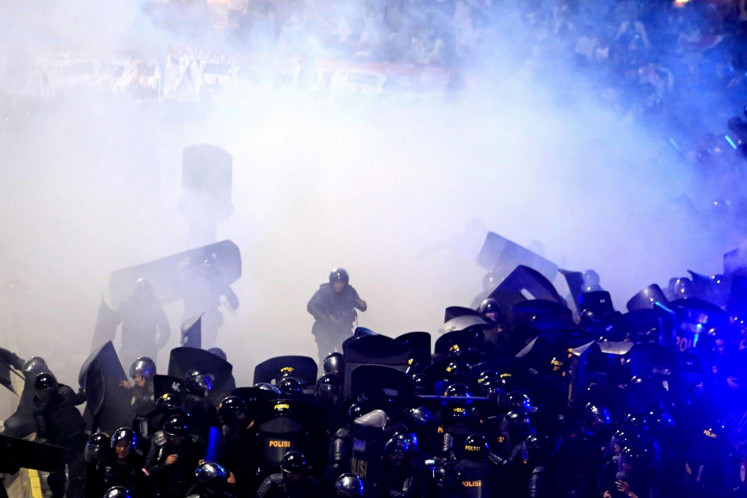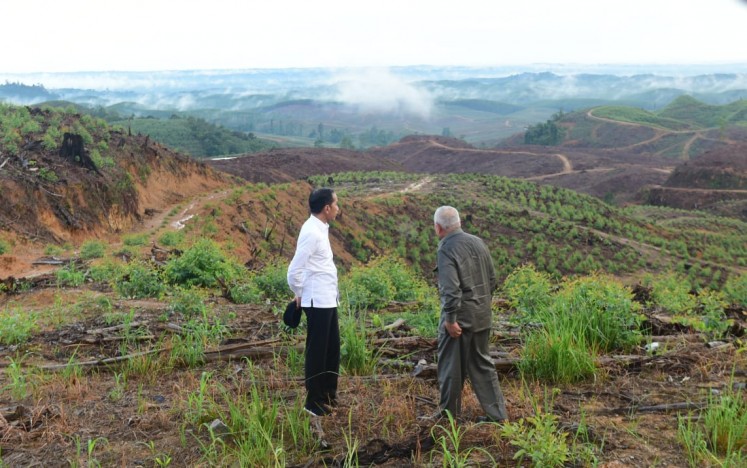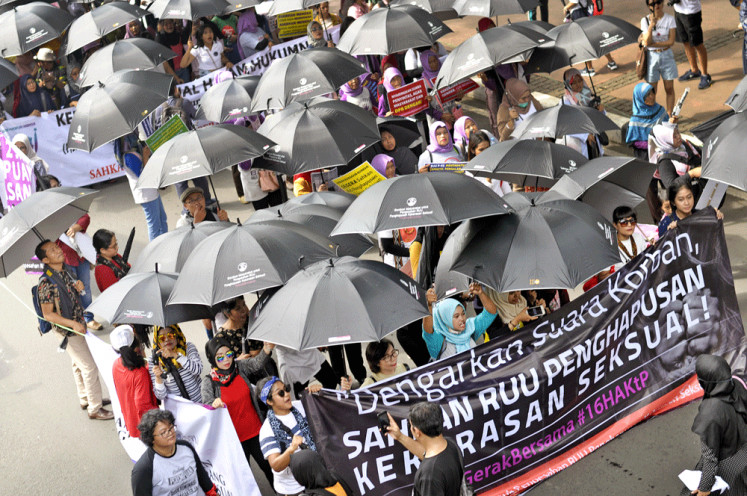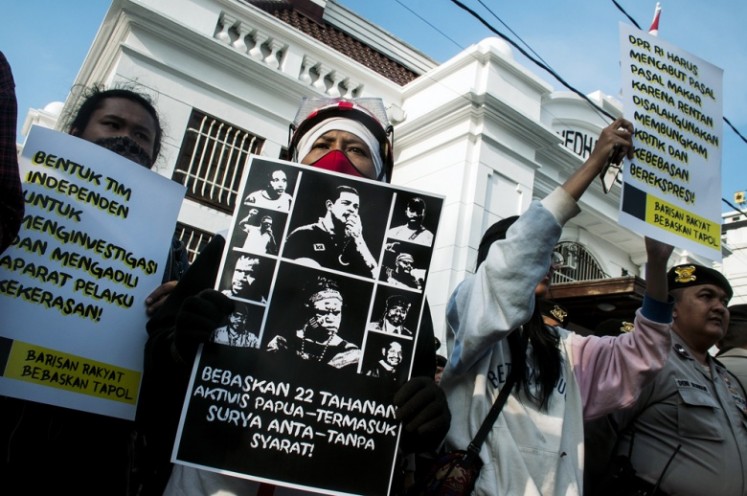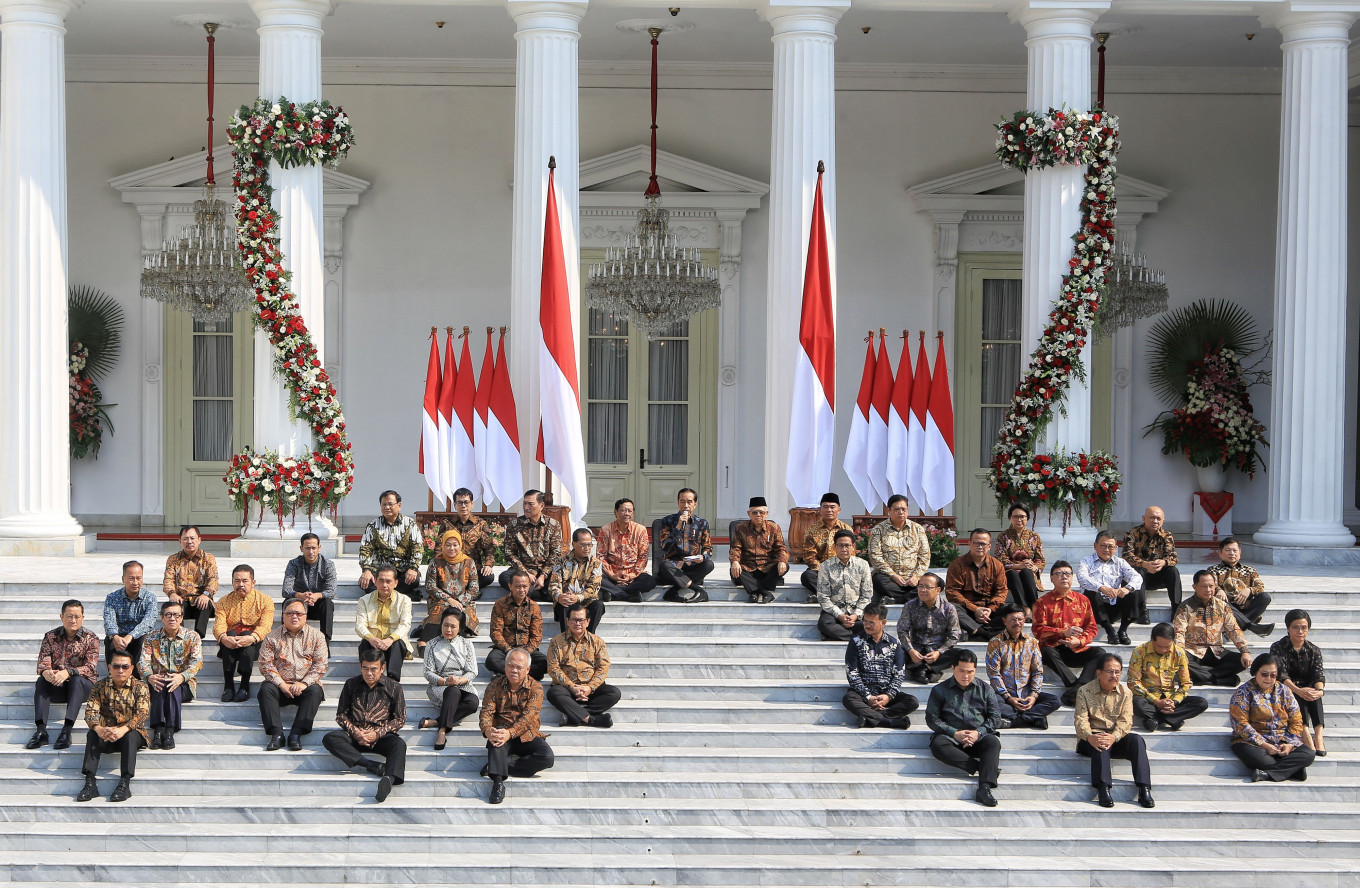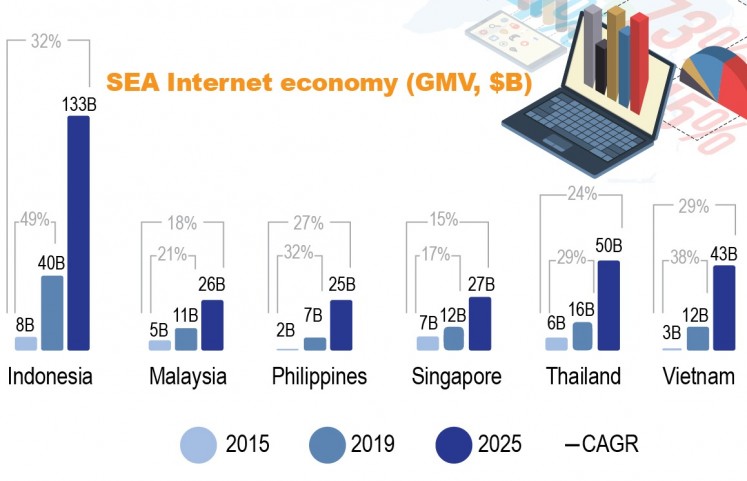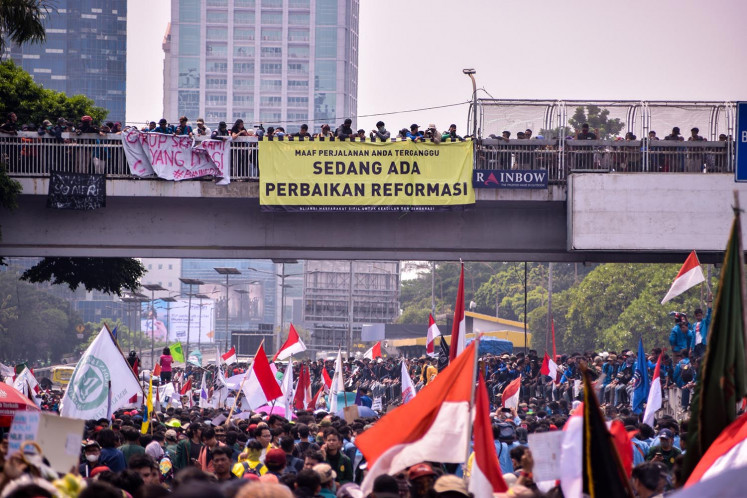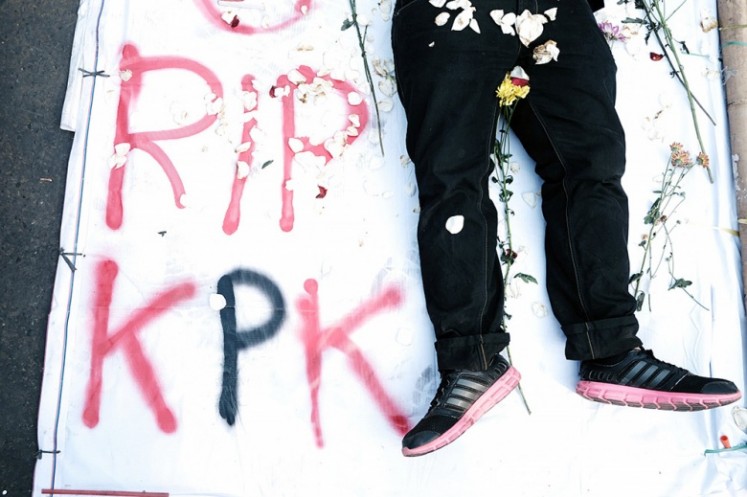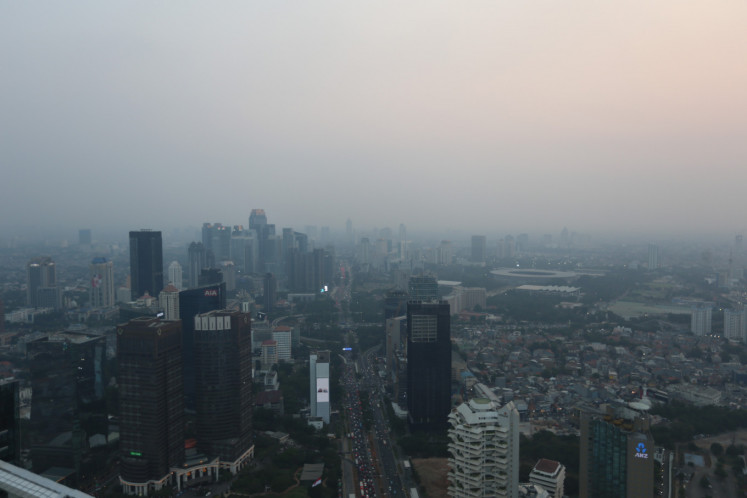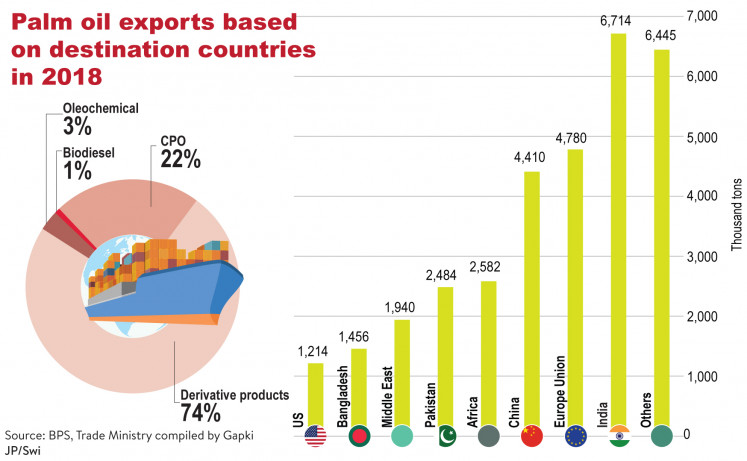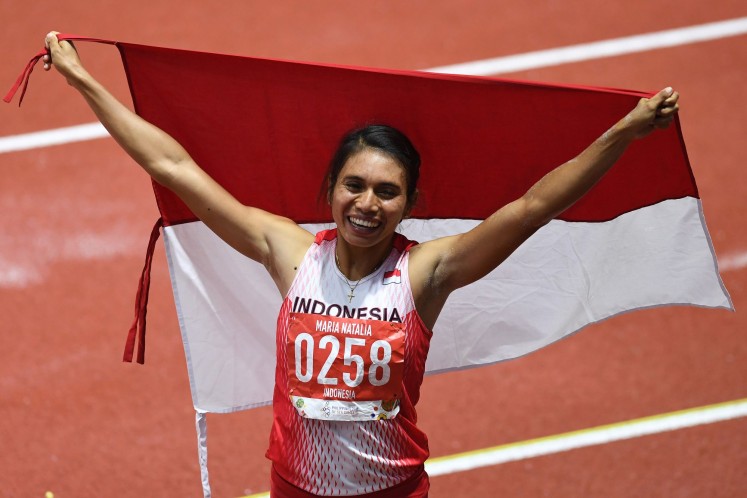Popular Reads
Top Results
Can't find what you're looking for?
View all search resultsPopular Reads
Top Results
Can't find what you're looking for?
View all search resultsFrom presidential rematch to sporting glory, here is 2019 in review
As we move to greet another new year, The Jakarta Post has wrapped up some of the most important events that defined the country throughout 2019.
Change text size
Gift Premium Articles
to Anyone
What happened in Indonesia over the past 365 days?
As we move to greet another new year, The Jakarta Post has wrapped up some of the most important events that defined the country throughout 2019.
From the tumultuous presidential election season and the growing fight against sexual violence to trade tensions with the European Union (EU), here are the events in the past year you may want to revisit.
Jokowi versus Prabowo, again
The beginning of 2019 saw months of political polarization surrounding the presidential election, which again pitted Joko “Jokowi” Widodo against his archrival Prabowo Subianto in a rerun of the previous 2014 race -- arguably the most divisive one in the country’s history to date.
Wrapping up the seven-month campaign season, election day on April 17 saw Jokowi leading in early vote counts. Prabowo, however, was quick to claim victory after voting day concluded, repeating a similar declaration he had made in 2014, which he lost.
Read: IT'S OVER: JOKOWI WINS
What followed after that was months of intense spats over the election results, occurring between the rival camps' supporters and through a legal battle lodged at the Constitutional Court, with Prabowo's side claiming that there had been "systematic, structural and massive" election-rigging that inflated Jokowi's tally.
The court, however, rejected all claims filed by the losing candidate, thereby upholding Jokowi's successful reelection bid into his second and final term in office.
Read: Game over, big role for Prabowo
Postelection riots haunt the capital
Police fired tear gas to Protesters during a riot near the Election Supervisory Agency (Bawaslu) headquarters in Jakarta, Indonesia, May 22, 2019. (JP/Seto Wardhana)The end of May saw riots breaking out in Jakarta after thousands of Prabowo supporters took to the streets to challenge the official result of the election. Unrest gripped the capital as at least nine civilians were killed in the trouble -- all of whom the police claimed were rioters. Four of them died from gunshot wounds, the police said, denying any involvement in the deaths.
Read: Who was behind Jakarta riots?
More than 170 alleged rioters arrested on May 21 to 23 have since been tried at the Central Jakarta District Court.
Four state officials were reportedly targeted for assassination during the riots. They were then coordinating political, legal and security affairs minister Wiranto, then coordinating maritime affairs minister Luhut Pandjaitan, State Intelligence Agency (BIN) chief Budi Gunawan and then National Police chief Gen. Tito Karnavian.
Read: Indonesian police accused of torture in May riots
Capital relocation plan starts taking shape
President Joko "Jokowi" Widodo (left) and East Kalimantan Governor Isran Noor take a stroll during a visit to the proposed location of the country's new capital in Sepaku district of North Penajam Paser, East Kalimantan on Dec. 18. (Presidential Palace Press Bureau/Muchlis Jr)Jokowi made global headlines in April after reviving a decades-old plan to move Indonesia's capital city from Jakarta, citing issues such as overcrowding in Java, environmental concerns and perennial traffic congestion in the metropolis.
The State Palace announced in August that East Kalimantan would host the country's new capital. Starting with land preparation in 2020, the government has set a four-year target until 2024 to conclude the detailed engineering design, groundbreaking for the new capital city development and capital city expansion plan.
Read: Jokowi's grand vision for new capital: Smart metropolis similar to Silicon Valley
The National Development Planning Ministry said the soon-to-be-built city -- which will sit on a 256,000-hectare site straddling the regencies of North Penajam Paser and Kutai Kertanegara -- is set to be a new province.
The new capital city project is estimated is to cost up to Rp 466 trillion (US$32.7 billion).
Read: 'What about Kalimantan's mighty forests?' Capital city plan raises questions about environment
The rise of Indonesia's #MeToo movement
Standing up against sexual violence: Carrying black umbrellas, activists march on Jl. MH Thamrin, Central Jakarta, on Sunday toward Aspiration Park near the Presidential Palace. The activists held a mass rally as part of this year’s global 16 Days of Activism Against Gender-based Violence campaign, during which they called on the government to immediately pass the sexual violence eradication bill into a law. (The Jakarta Post/Iqbal Yuwansyah)About a year ago, Gadjah Mada University’s (UGM) student magazine published an investigative report about sexual assault experienced by Agni, the pseudonym of a UGM student who was allegedly sexually assaulted by a fellow student during a community service program in 2017.
The issue ignited the rise of the #MeToo movement across the country, only here it was dubbed #KitaAgni (We are Agni). It went viral as people tried to pressure university leaders to immediately take action against Agni’s alleged assailant and end the culture of victim blaming.
Read: 'Rape culture myths' debunked: Survey
Inspired by Agni’s story, The Jakarta Post along with Tirto.id and Vice Indonesia engaged in a collaborative project titled #NamaBaikKampus (Campus Reputation). Together, the three conducted an online survey and received 207 statements, 174 of which were about cases of alleged sexual harassment – most of which were not reported to authorities.
Since the case came to light, some universities, including UGM have been working on regulations to address the issue.
Efforts to eradicate sexual violence, however, continued to face challenges this year, mainly after the deliberation of the sexual violence eradication bill still stalled at the House of Representatives. Lawmakers did not pass the bill as they ended their term on Sept. 30, with some raising objections to some of the articles, arguing that the bill would encourage casual sex and homosexuality.
Read: 'Don't let us fight by ourselves': The women who fight to make Indonesia a safer place
Restive Papua rocked by turmoil, violence
The way the Papuan problem is dealt with is a serious test for the nation — and Jokowi’s second term in office. Indonesia’s democracy is said to be at its lowest in 20 years. It’s often the government apparatus that violates its own laws and tramples on the civil, political and human rights of its own people. (Antara/Novrian Arbi)In August, a string of protests broke out in Papua and West Papua condemning racism in the wake of a racial abuse case in which Papuan students in East Java’s provincial capital of Surabaya were called “monkeys” and “pigs” over the alleged desecration of the national flag on the country’s 74th Independence Day.
The demonstrations – some of which descended into riots and led the government to impose an internet blackout in the restive region for “security reasons” – also spread nationwide, with some cities seeing protesters carrying banned Morning Star flags, a symbol of the Papuan independence movement.
Read: 'They label us with degrading prejudices': How Papuan students deal with everyday racism
Clashes between security officers and protesters broke out during rallies in a number of areas in the country's easternmost provinces, including in Deiyai regency of Papua, where reports of civilian casualties emerged. Dozens were arrested after the protests, including in Jakarta, with a number of them charged for treason.
In September, deadly unrest broke out in Wamena in Jayawijaya regency, Papua, as a mob – reportedly consisting of native Papuans – set buildings on fire and attacked residents with weapons. At least 33 people were killed in the riots, prompting tens of thousands to flee the region and causing losses amounting to Rp 479.5 billion (US$33.8 million).
Read: Wamena investigation: What the government is not telling us
Hype over Jokowi's new Cabinet and his millennial aides
Jokowi’s Indonesia Onward Cabinet 2019-2024 (JP/Seto Wardhana)Shortly after taking his oath for the second term of his presidency, Jokowi announced the members of his Indonesia Onward Cabinet, which saw a combination of old and new faces, professionals and politicians -- with some names raising eyebrows.
Among the surprising names was Prabowo -- Jokowi's own longtime political nemesis and former opposition leader -- who was chosen to lead the Defense Ministry. Others included Nadiem Makarim, founder and former CEO of the country’s first decacorn Gojek, who became the education and culture minister; former Indonesian Military (TNI) deputy commander Fachrul Razi who took the helm of the Religious Affairs Ministry as well as retired military general Terawan Agus Putranto who was tapped as Health Minister despite previous sanctions against him for ethics violations.
Read: Jokowi defends controversial Cabinet choices
The surprising announcements did not stop there with the President returning to make headlines nearly a month later as he introduced seven young faces as members of his new presidential expert staff, which has since been dubbed Jokowi's own millennial team of aides.
Read: Step aside, boomers: Here's Jokowi's new 'millennials' team
Indonesia drives toward digital economy and cashless society
Southeast Asia internet economy (gross merchandise value, in billion US dollar). (e-Conomy SEA 2019/JP/Hengky Wijaya)The growth of digital payment platforms has helped boost financial inclusion in the country as more and more Indonesians gain access to financial services.
A 2019 Fintech Report found that 82.7 percent of Indonesians are aware of e-wallet platforms, 62.4 percent are aware of digital investment and 56.7 percent of pay-later services. The study was published by state-owned PT Bank Rakyat Indonesia (BRI) and conducted by DS Research in November.
Read: More people shift to cashless lifestyle
In August, to further promote financial inclusion and boost cashless transactions, Bank Indonesia decided to start implementing Quick Response Indonesian Standards (QRIS) in the beginning of 2020. Through QRIS, the central bank expects to integrate the existing QR payment system that includes GoPay, OVO, DANA and LinkAja.
Transactions made using GoPay amounted to US$6.3 billion in February alone, nearly 70 percent of Gojek’s total transactions.
Indonesia’s digital economy is expected to reach $40 billion this year from last year’s $27 billion, according to a Google, Temasek and Bain & Company study.
Read: Indonesia’s digital economy 'well on track' to dominate Southeast Asia
Young people take to the streets in the name of democracy
Students protest against the planned revision Criminal Code and the revision to Corruption Eradication Commission law in front of the House of Representatives building in Senayan, Jakarta on Sept. 24, marking the biggest student movement since 1998. JP/Anggie Angela (JP/Anggie Angela)This year, Indonesia witnessed its largest student protests since those of 1998, making headlines in the national and international media as tens of thousands of young people staged large-scale demonstrations in cities across the country to reject what they described as attempts to roll back democracy and political reforms.
In the string of protests that mainly took place at the end of September, the students conveyed seven demands for the House of Representatives and the government, including rejection of the revised Criminal Code, passing the sexual violence eradication bill and an end to militarism in Papua.
Read: No, Indonesian students are not taking to the streets only to fight sex ban
The protests were supported by an online movement under the hashtag #ReformasiDikorupsi (Reform Corrupted), which had become the “thread” connecting the movements of students, workers, farmers, fishermen, schoolchildren and other groups in various cities.
The rallies, however, were marred by reports of police using excessive force while handling the protests in some cities, which saw clashes between students and security force personnel. Hundreds of students were injured, while two university students died after joining a protest in Kendari, Southeast Sulawesi, one of whom was shot dead.
Read: Jokowi’s allies are his biggest problem, not the students
Antigraft body under attack?
The KPK can only flourish where its independence is guaranteed. If it becomes answerable to the executive it is supposed to oversee, under the orders of government cronies chosen for political convenience, the notion that it could offer any real resistance to corruption would be laughable. Laughable, that is, were the inevitable impact on Indonesian democracy not so truly tragic. (JP/Donny Fernando)The year 2019 may be remembered as the year the Corruption Eradication Commission (KPK) and antigraft activists fought a losing battle.
It was the revision of the KPK Law -- which was hastily passed by the House in September -- that many deemed as part of the effort to undermine the country's fight against corruption.
Read: Jokowi 'lacks political will' to save KPK
The revision mandated the formation of a supervisory council to oversee the KPK -- which was officially established and inaugurated by Jokowi on Dec. 20 -- and to issue warrants for raids, wiretapping and evidence seizure.
The inauguration of Comr. Gen. Firli Bahuri as the chairman of the antigraft body for the term 2019-2023 also came under scrutiny, as previous KPK leaders and antigraft activists claimed the three-star general was suspected of “gross ethical violations".
Read: KPK's new era
Jakarta's air pollution is so bad it drives residents to sue government
Smog blankets Jakarta’s skyscrapers on Aug. 19, 2019. Air pollution in the city is among the worst in the world. (JP/Donny Fernando)Residents of Greater Jakarta are used to not seeing clear blue skies as the city has been blanketed by thin – sometimes thick – smog for years, but 2019 saw more eyes scrutinizing the poor air quality in Indonesia's capital, which is mainly polluted by emissions from millions of motorized vehicles, coal-fired power plants and industrial gas waste.
The air contains, among many other pollutants, high amounts of PM2.5 and PM10. These are particulate matter measuring, respectively, 2.5 and 10 microns – so small that they penetrate the lungs’ surface, enter the blood system and pose health threats.
Read: Jakarta gasps for air: 2019 marks history in fight against severe air pollution
Some Greater Jakarta residents filed a landmark civil lawsuit at the Central Jakarta District Court to demand the government do something about the air pollution. The hearing of the historic lawsuit commenced in August.
Also in August, Jakarta Governor Anies Baswedan issued Gubernatorial Instruction No. 66/2019 on air quality control in a bid to curb air pollution in the capital.
Read: Can air pollution trigger depression and schizophrenia?
Trade spats with the EU: Palm oil and nickel export brouhaha
Indonesia palm oil export destinations in 2018. (JP/Swi)The year 2019 saw escalating tension between Indonesia and the EU over palm oil, especially after the European Commission -- the EU's executive arm -- laid out plans to phase out its use in biofuels by 2030 and categorizing palm oil as an unsustainable product.
Earlier this month, the world's top palm oil producer announced that the country had filed a lawsuit with the World Trade Organization (WTO) against the EU’s palm oil policy, which Indonesia alleged to be “discriminatory” toward the nation’s palm oil.
Read: Keep calm and send your palm oil: EU brushes off concerns as Indonesia files WTO lawsuit
Indonesia's lawsuit came shortly after the bloc filed a complaint with the WTO over Indonesia's nickel export ban and alleged illegal subsidies in November, saying that the ban "goes against WTO rules."
The government previously announced in September that it would ban nickel ore exports starting January 2020 -- two years earlier than previously planned. As the world’s largest nickel producer, Indonesia's decision has shocked foreign manufacturers including those in China, Europe and Japan.
Read: Indonesia, EU embroiled in fresh trade spat over nickel export ban, subsidies
Indonesia's SEA Games team returns in glory
Indonesian track and field star maria Natalia Londa spreads the Red-and-White flag after winning the gold medal in women’s long jump during the 30th Southeast Asian (SEA) Games at New Clark Athletics Stadium in the Philippines on Dec. 8, 2019. (Antara/Nyoman Budhiana)Indonesia's Southeast Asia (SEA) Games medalists returned home with a stunning medal haul despite falling short of Jokowi's own request to finish in the top-two in the medal table.
The country's contingent achieved the Youth and Sports Ministry’s goal by finishing fourth at the 2019 SEA Games in the Philippines, securing 72 gold, 84 silver and 111 bronze medals, behind overall champion and host the Philippines (149 gold, 117 silver and 121 bronze), second-placed Vietnam (98 gold, 85 silver and 105 bronze) and third-placed Thailand (92 gold, 103 silver and 123 bronze).
Read: Sea Games: For the pride of Indonesia
The competition saw the emergence of several new stars. Dea Salsabila Putri, who competed in the modern pentathlon, won three gold medals – the highest tally of any Indonesian athlete at the Games.
The Indonesian men’s water polo team also created history by winning its first-ever gold medal, breaking Singapore’s dominance in the sport since it was first featured at the SEA Games in 1965.
Read: Signs of progress offer hope for Indonesian sports

